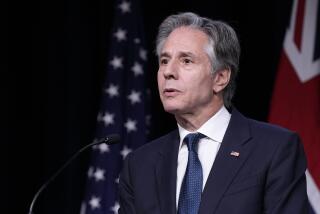U.S. Agrees to Use U.N. Court for Darfur Cases
WASHINGTON — The United States is dropping its objections to use of the U.N.’s International Criminal Court to try Sudanese accused of being behind an ethnic cleansing campaign in the Darfur region that has killed tens of thousands of people and uprooted more than 2 million, administration officials said Wednesday night.
The administration had preferred that an African court try the cases but agreed to a compromise during daylong discussions Wednesday at the United Nations.
The United States has strongly opposed the ICC, arguing that American military personnel or civilians serving overseas could be subject to politically motivated prosecutions.
In return for its concession, the United States received assurances that Americans deployed in Sudan, in whatever capacity, would not be subject to ICC prosecutions, the officials said. The officials asked not to be identified because the decision had not been formally announced.
The decision could raise hackles among U.S. conservatives for whom the ICC is an unaccountable body that cannot be trusted. The 97 countries that have ratified the 1998 Rome Treaty establishing the court maintain that there are sufficient safeguards built into the process to prevent unwarranted prosecutions.
The administration agreed to a compromise after concluding that opposition to the U.S. stand was too strong, particularly among Europeans, who have been united in support of the ICC as the trial venue.
The western Sudanese region of Darfur has been the scene of perhaps the world’s worst humanitarian crisis.
The widespread death and destruction have been the result of a brutal counterinsurgency campaign led by Arab militias, allegedly backed by the Sudanese government, against black farmers. The conflict began in February 2003.
In September, then-Secretary of State Colin L. Powell said the perpetrators had engaged in genocide. Tens of thousands of people displaced from Darfur are confined to refugee camps, refusing to return to their villages for fear they would only be forced to flee again.
More to Read
Sign up for Essential California
The most important California stories and recommendations in your inbox every morning.
You may occasionally receive promotional content from the Los Angeles Times.










